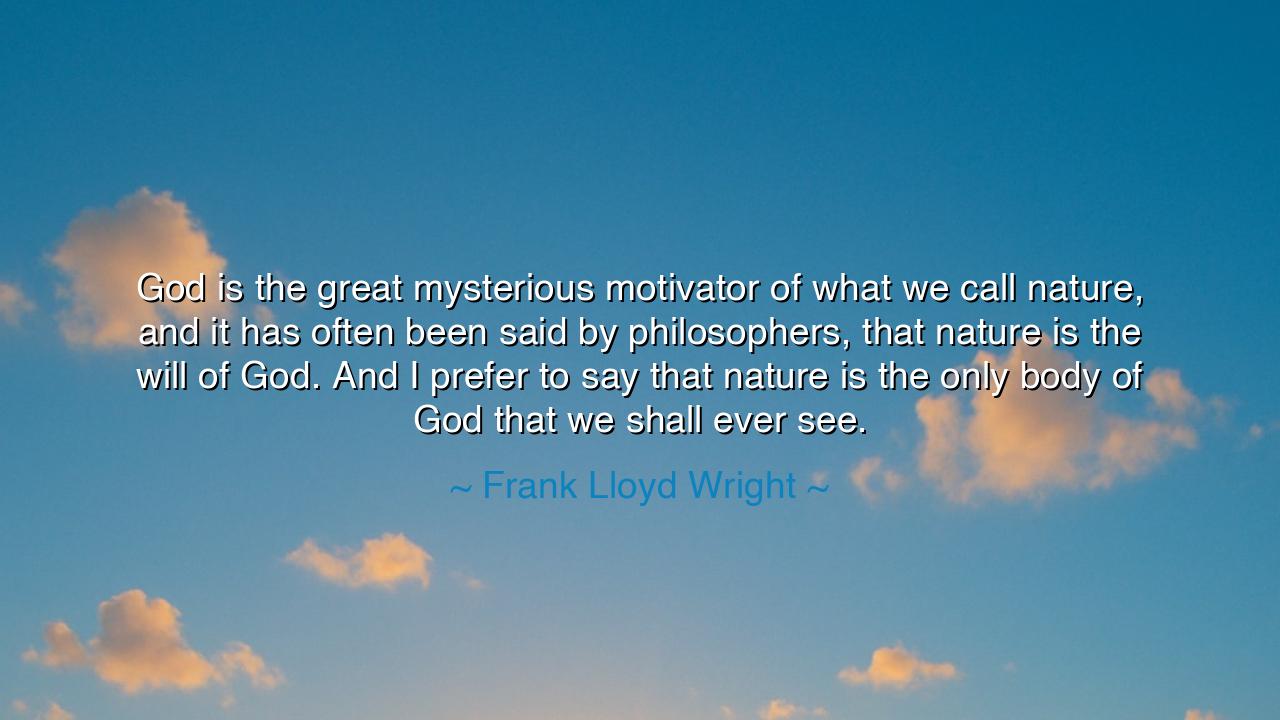
God is the great mysterious motivator of what we call nature
God is the great mysterious motivator of what we call nature, and it has often been said by philosophers, that nature is the will of God. And I prefer to say that nature is the only body of God that we shall ever see.






Frank Lloyd Wright, the master builder who sought harmony between human creation and the living world, once declared: “God is the great mysterious motivator of what we call nature, and it has often been said by philosophers, that nature is the will of God. And I prefer to say that nature is the only body of God that we shall ever see.” In these words, he binds together the language of divinity and the reality of nature, teaching that to seek God is not to gaze into abstraction, but to look upon the earth, the sky, the water, and the living green that surrounds us. For Wright, nature was not simply the backdrop of human life—it was the very embodiment of the sacred.
The origin of this insight comes from Wright’s philosophy of organic architecture. He believed that buildings should grow from the land, shaped by its lines and materials, not imposed upon it. To him, architecture was not separate from nature, but a continuation of it—a human echo of divine creation. Thus his reverence for nature became more than sentiment; it was theology and design entwined. He saw the forest, the river, and the desert not merely as resources, but as the body of God, a visible revelation of mystery itself.
History echoes this teaching in other voices. The ancient Stoics spoke of logos, the divine reason that pervades the universe, visible in the order of the natural world. Saint Francis of Assisi called the sun his brother and the moon his sister, seeing in all creation the living face of God. In the East, Taoist sages spoke of the Tao flowing through rivers, stones, and winds, a sacred force that could only be known by observing the patterns of nature. Wright’s words join this ancient chorus: to touch God, touch the earth; to see God, see the tree, the bird, the flowing stream.
Yet Wright’s phrasing has its own power. He does not say that nature reflects God, but that it is the only body of God we shall ever see. This is both humbling and heroic. It strips away illusions of a distant throne in the sky and anchors divinity in the soil beneath our feet. It commands us not to wait for heaven’s vision, but to revere the vision already given—the sunrise, the thunderstorm, the blooming flower. It is a theology of immediacy, where reverence becomes a daily act of seeing and honoring the world.
The emotional weight of his words is also a warning. If nature is the only body of God we shall see, then to desecrate it is not merely foolish—it is sacrilege. To poison rivers, to cut forests without thought, to cover the land with soulless structures is to wound the body of the divine. Wright’s life, dedicated to designing in harmony with landscapes, was a rebellion against this desecration. His buildings, like Fallingwater, seem to grow from the earth itself, whispering the lesson that to dwell well is to dwell reverently within God’s body.
The lesson for us is clear: if you seek God, open your eyes to the world around you. Do not look only to books and doctrines, but to the seasons, the rhythms of life, the stars wheeling in the heavens. Let nature be your scripture, your temple, your teacher. To live in reverence toward nature is to live in reverence toward God. To exploit it without care is to deny the presence of the sacred.
Practically, this means cultivating gratitude and stewardship. Walk in the woods not only as recreation, but as worship. Care for the soil, the water, and the air not only as resources, but as sacred trust. When you build, create, or act, do so in harmony with the land, remembering Wright’s call: that nature is the divine body revealed. Such a way of life transforms both our inner spirit and the outer world.
Thus, Frank Lloyd Wright’s words resound as both poetry and prophecy. God is mystery, nature is revelation, and to see the divine is to look upon the living world. Carry this teaching, O seeker, and let your life be lived as one continuous act of reverence for the body of God that surrounds you. For in honoring nature, you honor the eternal itself.






AAdministratorAdministrator
Welcome, honored guests. Please leave a comment, we will respond soon